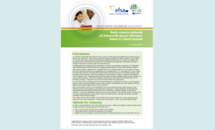Joint Rapid Outbreak Assessment: Multi-country outbreak of Salmonella Agona infections linked to infant formula
An outbreak of Salmonella Agona linked to the consumption of infant formula (powdered milk) has been ongoing in France since August 2017. As of 11 January 2018, the outbreak had affected 39 infants (children <1 year of age): 37 in France, one in Spain confirmed by whole genome sequencing (WGS) and one in Greece, considered to be associated with this event based on the presence of a rare biochemical characteristic of the isolate. The date of symptom onset for the most recent case was 2 December 2017.
Executive summary
The widespread recall of several infant formula products made by a French processing company is likely to significantly reduce the risk of infants being infected by Salmonella Agona, according to the risk assessment published today by ECDC and the European Food Safety Authority (EFSA). However, as long as there are potentially contaminated products circulating, new cases may still be detected.
An outbreak of S. Agona linked to the consumption of infant formula has been ongoing in France since August 2017. So far, the outbreak has affected 39 children under one year of age: 37 in France, one in Spain confirmed by whole genome sequencing (WGS) and one in Greece, considered to be associated with this event.
Investigations identified seven different brands of infant formula from a single processing company in France as the vehicles of infection. All products manufactured since 15 February 2017, including products other than infant formula, have been recalled and/or withdrawn, as a precautionary measure.
Recalled products have been distributed to 13 countries in the European Union (Belgium, Bulgaria, Cyprus, the Czech Republic, France, Greece, the Netherlands, Romania, Slovenia, Slovakia, Spain and the United Kingdom) and to 54 other countries.
Most of the batches involved in the investigation have not yet passed the expiry date and may still be available to consumers, which is why the detection of new cases cannot be excluded.
Prevention and control measures
To prevent infections, both in infants and caregivers, the formulas involved in this outbreak should not be used.
General recommendations for preparing infant formula include:
- Washing hands before and after the preparation of the bottle;
- Bottles should not be prepared in advance and contents discarded if not consumed within two hours.
Caregivers of children who have consumed infant formula and develop diarrhoea should contact their health care provider. All cases of S. Agona should be notified to the national health authorities.
ECDC and EFSA encourage the competent authorities in affected EU/EEA countries to continue sharing information on the epidemiological, microbiological and environmental investigations.
ECDC offers WGS services to EU/EEA countries that do not have the capacity for a timely sequencing and analysis as part of this investigation.
Download
Erratum: on page 6, in the section on Greece, a reference to ‘Brand E’, which appeared in the version dated 17 January 2018, was corrected on 18 January 2018 to ‘Brand F’.






